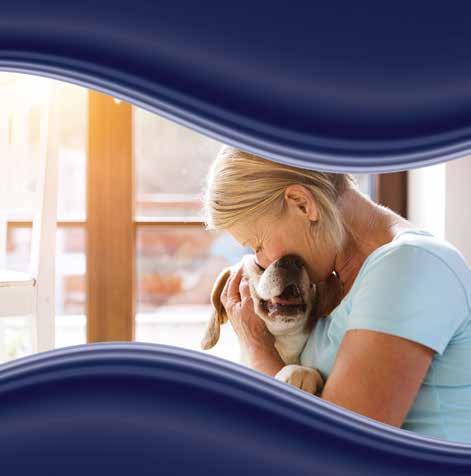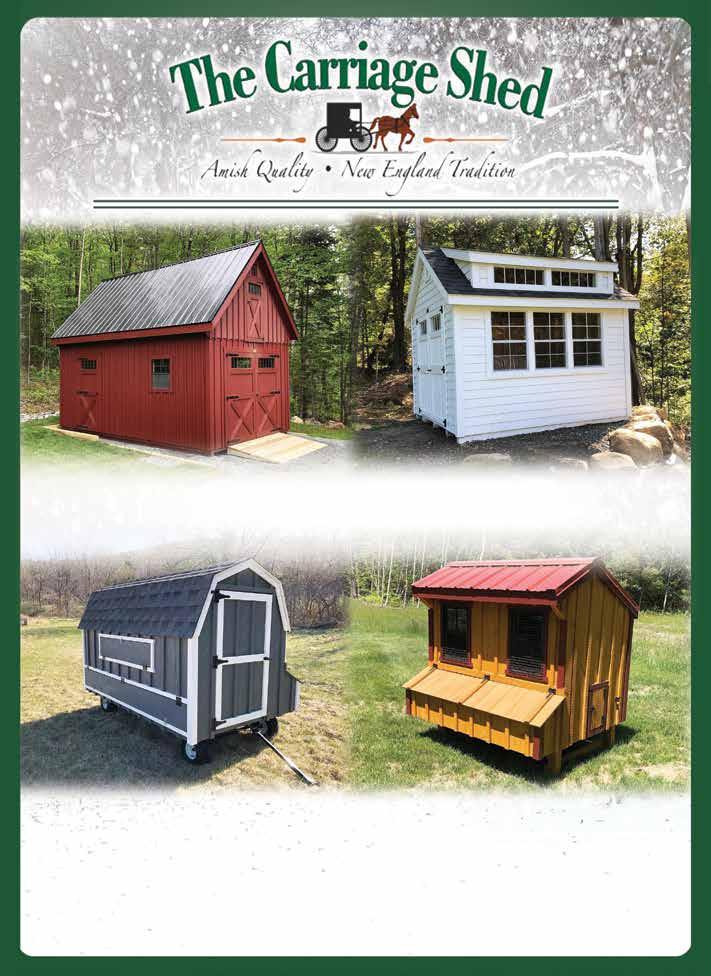
6 minute read
Not So Cold, After All Dorothy Crosby
Not So Cold, After All
Dorothy Crosby - Stoddard, NH
Advertisement
The cold season seems to have already begun, a welcome break for some and a dreaded reality for others. Our equine friends generally fare well in the cold - no bugs, no overheating, and a natural coat to keep their temperature regulated. They legally must have shelter in NH and VT from approximately November through May, but are none-the-less contained in human-designed pastures or paddocks; still, ample space to move around helps them stay warmer, as they are wired to move about when cold.
Just like their people, many horses enjoy some time off, while others continue to happily work through the cold months. Both emotional and physical benefits come with work: increased circulation and improved temperature regulation, fitness, relief from boredom, variation in schedule, improved mood, and attitude. Any season-related extra days off must sometimes be a boost to them as they are to us. Weathering the weather can be a challenge even with a huge fur coat!
For those who may not have enough time or sufficient daylight or even a place for a lengthy ride, but do have a place to get out of the elements, it’s sometimes fun to dabble in something different for a few minutes here and there, perhaps a few times a week: learn and practice some bodywork techniques or groom those long coats until they are rid of winter dandruff, try out the idea you saw in a video or read in a book, learn a skill you’ve never spent time on (leg wraps, braiding, banding, ground driving), pamper your horse – or yourself - with a new tradition.
One of my favorite traditions – it’s been years, I think – only takes a very short time (maybe 15-30 seconds, though certainly more is ok.) It’s simple, but beneficial to both of us for the long term. It doesn’t take much space, and in inclement weather we have successfully done this in the barn aisle, using our space creatively and partnering together!
Every morning as I turn the horses out, I practice a simple in-hand maneuver with each in turn. Generally, it is along the lines of a turn on the forehand or haunches out on a circle to help me assess their stiffness, help them move and loosen up the tight spots, and refine my applied aids. Working on each side, once we’ve accomplished a full circle, it’s often turned into a side pass or leg Winter 2021 yield for several steps. Sometimes I move their shoulders or create some sort of variation, combining maneuvers. In each thing, they have to respond to my quiet hand and body aids, and they usually do their best to try. As I utilize the 4 Basics of Centered Riding® – Centering, Breathing, Soft Eyes, and Building Blocks – even on the ground, we both become centered and relaxed; it becomes more fun and increasingly easier each day. They learn new things, literally stretch their bodies, learn to cross-over their legs, and improve their overall movement through this simple practice; moving the parts is, after all, how we keep them supple and flexible.
Yes, they do turn it into a game and no doubt are often motivated and rewarded by the treat they know is waiting in my pocket for when we are done! For me, this is an opportunity to connect with each horse on some level, requiring some cooperative effort and reinforcing the human contact that can be so important to their attitudes when I really need cooperation. It has become a game my guys appear to look forward to; if I’m in a hurry and attempt to skip it, the horse will linger in the barnyard, waiting for the attention - and, of course, the expected treat. Still, when a said treat is delivered, they sometimes follow me for a second or two as if wondering why we are not dancing today! Ok, so it could be in hopes of another treat, but this is fairly consistent, always at the same time of day - and as routine is so important, I suspect I am at least partially correct!
Regardless of your plans for winter, the reality of your situation, or the preferences you have, I wish for you a safe and healthy season including plenty of memorable moments: learning moments, bonding moments, growthful moments….. enjoy your critters, large and small, and relish the moments that help you find yourself, your purpose, and your loves. Take care to make every one of those moments count in some way. Even the frustrating and stressful moments have value and teach us much. And just cherish those equine moments that can’t help but bring a tear to your eye, a smile to your face, or a chuckle to your voice. There’s no greater blessing than sharing those moments and memories.




Everything was going so well…
What to do when your dog has a behavioral setback
Paula Bergeron - Grafton, NH
Behavioral issues in dogs are more 1. What action plan helped solve common than one might think, every- the original problem and have I been thing from counter surfing, and sock consistently following that plan? eating, to lunging, barking, snapping, It is very common for all of us to slack and biting. Most dogs develop some hab- off when things begin to go well, but its in their lives that cause their families just as returning to eating junk food to look for help to solve the probem. But can cause one to regain weight, returnwhat do you do when after a training ing to old patterns with your dog can success story you suddenly experience a cause old unwanted behaviors to return. setback? After an incident of old unwanted behavior most owners feel emotional. 2. Has there been any major changWhether it be anger, frustration, fear, or es in my dog’s routine, or pack? sadness it is important not to discipline A change in the daily routine or adding your dog while under the influence of a human or animal to your household big emotions. Give you and your dog can cause your dog to feel insecure and some space from one another and take anxious, and anxiety is never helpful time to understand what led up to the when striving to maintain good behavbehavioral “incident” To understand your ioral management. dog’s behavior, begin by asking some questions about your own. 3. Have I recently suffered an ill-
ness or emotional crisis?
A human in crisis is not an effective leader. Your dog feeling an absence of solid leadership may not be able to maintain newly learned skills or behaviors.
4. Have I been consistently providing my dog with the exercise and structure needed to maintain good emotional balance?
Pent up or frustrated energy make it very difficult for any dog to be able to follow commands or resist impulsive behavior.
5. Did I unwittingly place my dog into a situation they were not ready to handle? Did I move too fast, expect too much, or just forget to pay attention?
These questions are all directed towards the actions of the human because most often the set back with your dog has been the result of human error, or even more common human fatigue. (believe me, I am very familiar with both). So before you hand out discipline for an upsetting behavioral incident make sure that said discipline is headed in the right direction. :)

Keep your chin up folks, and keep at it! And as always, Happy Training!











